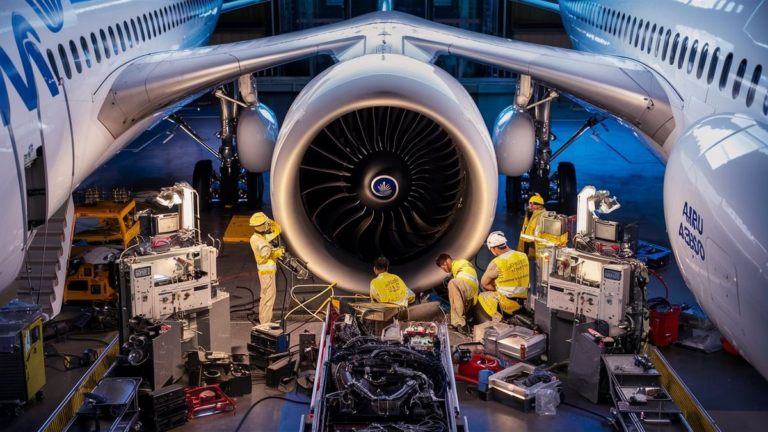Recent incidents involving Airbus A380 engines have raised concerns within the aviation industry and among passengers worldwide. The Airbus A380, known for its grandeur and capacity, has faced challenges related to its engine performance, prompting a closer examination of safety protocols and maintenance practices.
The Complexity of Airbus A380 Engines
The Airbus A380 is powered by four engines, each designed to deliver optimal performance and efficiency. However, the sheer size and complexity of these engines make them susceptible to various technical issues and malfunctions.
Technical Challenges
One of the primary concerns associated with Airbus A380 engines is the occurrence of technical failures during flight. These failures can range from minor glitches to more severe malfunctions, impacting the aircraft’s ability to operate safely.
Common technical challenges include issues with engine components, fuel delivery systems, and electronic control systems. These problems can arise due to manufacturing defects, wear and tear, or environmental factors.
Safety Implications
The safety implications of Airbus A380 engine problems cannot be overstated. Engine failures or malfunctions pose significant risks to passengers, crew members, and the aircraft itself. In some cases, these incidents have resulted in emergency landings and disruptions to air travel schedules.
Ensuring the safety and reliability of Airbus A380 engines requires comprehensive maintenance procedures and rigorous testing protocols. Airlines and maintenance providers must adhere to strict guidelines set forth by aviation authorities to mitigate the risks associated with engine problems.
Addressing the Challenges
Efforts to address Airbus A380 engine problems are underway, with manufacturers and aviation stakeholders collaborating to enhance engine design, performance, and reliability. This includes investing in advanced technology and materials to improve engine efficiency and durability.
Advanced Monitoring Systems
One of the key strategies for mitigating Airbus A380 engine problems is the implementation of advanced monitoring systems. These systems allow operators to track engine performance in real-time and identify potential issues before they escalate into safety concerns.
By leveraging data analytics and predictive maintenance techniques, airlines can proactively address engine problems and minimize the impact on flight operations. This proactive approach helps enhance safety standards and passenger confidence in Airbus A380 aircraft.
Airbus A380 engine problems represent a significant challenge for the aviation industry, requiring proactive measures to ensure the safety and reliability of these iconic aircraft. By addressing technical challenges, implementing advanced monitoring systems, and prioritizing maintenance protocols, stakeholders can enhance the overall safety and performance of Airbus A380 engines.
Environmental Considerations
Environmental factors play a crucial role in the performance and longevity of Airbus A380 engines. Operating in diverse climates and conditions can subject the engines to varying levels of stress and wear. Extreme temperatures, high altitudes, and adverse weather conditions can all impact engine efficiency and reliability.
Furthermore, environmental regulations and sustainability initiatives drive the development of more eco-friendly engine technologies. Manufacturers are exploring cleaner and more fuel-efficient propulsion systems to reduce emissions and minimize the environmental footprint of air travel.
Collaborative Research and Development
Collaborative efforts between aircraft manufacturers, engine suppliers, and research institutions are instrumental in addressing Airbus A380 engine challenges. By pooling resources and expertise, stakeholders can innovate solutions to enhance engine performance, reliability, and safety standards.
Research initiatives focus on identifying root causes of engine problems, exploring novel materials and manufacturing techniques, and refining maintenance practices to prolong engine lifespan and optimize operational efficiency.
Frequently Asked Questions
1. What are the most common technical challenges faced by Airbus A380 engines?
2. How do advanced monitoring systems contribute to mitigating engine problems?
3. What role do environmental factors play in the performance of Airbus A380 engines?
4. How are manufacturers and aviation stakeholders collaborating to address engine challenges?
5. What initiatives are underway to develop more eco-friendly engine technologies for the Airbus A380?
| Question | Answer |
|---|---|
| What are the most common technical challenges faced by Airbus A380 engines? | Common technical challenges include issues with engine components, fuel delivery systems, and electronic control systems. |
| How do advanced monitoring systems contribute to mitigating engine problems? | Advanced monitoring systems allow operators to track engine performance in real-time and identify potential issues before they escalate into safety concerns. |
| What role do environmental factors play in the performance of Airbus A380 engines? | Environmental factors such as extreme temperatures, high altitudes, and adverse weather conditions can impact engine efficiency and reliability. |
| How are manufacturers and aviation stakeholders collaborating to address engine challenges? | Manufacturers and aviation stakeholders collaborate on research and development initiatives to enhance engine performance, reliability, and safety standards. |
| What initiatives are underway to develop more eco-friendly engine technologies for the Airbus A380? | Initiatives focus on developing cleaner and more fuel-efficient propulsion systems to reduce emissions and minimize the environmental footprint of air travel. |
See also:






